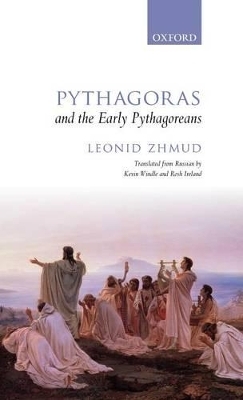
Pythagoras and the Early Pythagoreans
Oxford University Press (Verlag)
978-0-19-928931-8 (ISBN)
Pythagoras (c. 570 - c. 495 BC), arguably the most influential thinker among the Presocratics, emerges in ancient tradition as a wise teacher, an outstanding mathematician, an influential politician, and as a religious and ethical reformer. He claimed to possess supernatural powers and was the kind of personality who attracted legends. In contrast to his controversial and elusive nature, the early Pythagoreans, such as the doctors Democedes and Alcmaeon, the Olympic victors Milon and Iccus, the botanist Menestor, the natural philosopher Hippon, and the mathematicians Hippasus and Theodorus, all appear in our sources as 'rational' as they can possibly be. It was this 'normality' that ensured the continued existence of Pythagoreanism as a philosophical and scientific school till c. 350 BC.
This volume offers a comprehensive study of Pythagoras and the early Pythagoreans through an analysis of the many representations of the Teacher and his followers, allowing the representations to complement and critique each other. Relying predominantly on sources dating back to before 300 BC, Zhmud portrays a more historical picture of Pythagoras, of the society founded by him, and of its religion than is known from the late antique biographies. In chapters devoted to mathematical and natural sciences cultivated by the Pythagoreans and to their philosophies, a critical distinction is made between the theories of individual figures and a generalized 'all-Pythagorean teaching', which is known from Aristotle.
Leonid Zhmud has been working at the Institute for the History of Science and Technology in St. Petersburg since 1987 and is currently a leading academic researcher. In 1989, together with Lev Lurje, he founded the first Classical High School in Leningrad (Gymnasium Classicum Petropolitanum). Between 1990-2010 he held a vaiety of positions and fellowships, such such as the Alexander von Humboldt Research Fellow at Constance University, Germany, Junior fellow at the Center for Hellenic Studies in Washington DC, visiting fellowship at Maison des Sciences de l'Homme in Paris, and member of the Institute for Advanced Study, Princeton, and the Wellcome Trust for the History of Medicine, London. He is the author of Wissenschaft, Philosophie und Religion im frühen Pythagoreismus (Berlin: Akademie Verlag, 1997), and The Origin of the History of Science in Classical Antiquity (Berlin: W. de Gruyter, 2006).
INTRODUCTION: THE PYTHAGOREAN QUESTION: PROBLEMS, METHODS, AND SOURCES; ABBREVIATIONS OF THE SOURCES; BIBLIOGRAPHY
| Übersetzer | Kevin Windle, Rosh Ireland |
|---|---|
| Verlagsort | Oxford |
| Sprache | englisch |
| Maße | 161 x 227 mm |
| Gewicht | 778 g |
| Themenwelt | Geschichte ► Allgemeine Geschichte ► Vor- und Frühgeschichte |
| Geschichte ► Allgemeine Geschichte ► Altertum / Antike | |
| Geisteswissenschaften ► Philosophie ► Philosophie Altertum / Antike | |
| Geisteswissenschaften ► Religion / Theologie | |
| Mathematik / Informatik ► Mathematik ► Geschichte der Mathematik | |
| Naturwissenschaften | |
| ISBN-10 | 0-19-928931-X / 019928931X |
| ISBN-13 | 978-0-19-928931-8 / 9780199289318 |
| Zustand | Neuware |
| Haben Sie eine Frage zum Produkt? |
aus dem Bereich


